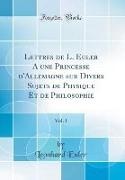vergriffen
Leonhard Euler
Lettres de L. Euler A une Princesse d'Allemagne sur Divers Sujets de Physique Et de Philosophie, Vol. 1 (Classic Reprint)
Französisch · Fester Einband
Beschreibung
Excerpt from Lettres de L. Euler A une Princesse d'Allemagne sur Divers Sujets de Physique Et de Philosophie, Vol. 1
Mais ce qu'on aime aussi à trouver dans ces Lettres, et ce qu'on ne pourrait pas s'attendre à rencontrer dans des ouvrages d'une nature plus abstraite, c'est l'empreinte profonde du caractère de l'auteur, de ses habitudes morales, de ses croyances religieuses. L'alliance de la simplicité du coeur et de la hauteur des pensées, le contraste entre la foi na1ve d'euler et le scepticisme de son siècle, ne sont pas ce qu'il y a de moins curieux dans la correspondance du grand géomètre avec sa royale élève, et n'ont pas peu contribué à lui attirer des lec teurs.
About the Publisher
Forgotten Books publishes hundreds of thousands of rare and classic books. Find more at www.forgottenbooks.com
This book is a reproduction of an important historical work. Forgotten Books uses state-of-the-art technology to digitally reconstruct the work, preserving the original format whilst repairing imperfections present in the aged copy. In rare cases, an imperfection in the original, such as a blemish or missing page, may be replicated in our edition. We do, however, repair the vast majority of imperfections successfully; any imperfections that remain are intentionally left to preserve the state of such historical works.
Über den Autor / die Autorin
Leonhard Euler (/'??l?r/ OY-l?r;[2] German: ['??l?r] (About this sound listen); 15 April 1707 - 18 September 1783) was a Swiss mathematician, physicist, astronomer, logician and engineer, who made important and influential discoveries in many branches of mathematics, such as infinitesimal calculus and graph theory, while also making pioneering contributions to several branches such as topology and analytic number theory. He also introduced much of the modern mathematical terminology and notation, particularly for mathematical analysis, such as the notion of a mathematical function.[3] He is also known for his work in mechanics, fluid dynamics, optics, astronomy, and music theory.[4]
Euler was one of the most eminent mathematicians of the 18th century and is held to be one of the greatest in history. He is also widely considered to be the most prolific mathematician of all time. His collected works fill 60 to 80 quarto volumes,[5] more than anybody in the field. He spent most of his adult life in Saint Petersburg, Russia, and in Berlin, then the capital of Prussia.
A statement attributed to Pierre-Simon Laplace expresses Euler's influence on mathematics: "Read Euler, read Euler, he is the master of us all."[6][7]
Leonhard Euler was born on 15 April 1707, in Basel, Switzerland to Paul III Euler, a pastor of the Reformed Church, and Marguerite née Brucker, a pastor's daughter. He had two younger sisters: Anna Maria and Maria Magdalena, and a younger brother Johann Heinrich.[8] Soon after the birth of Leonhard, the Eulers moved from Basel to the town of Riehen, where Euler spent most of his childhood. Paul Euler was a friend of the Bernoulli family; Johann Bernoulli was then regarded as Europe's foremost mathematician, and would eventually be the most important influence on young Leonhard.
Euler's formal education started in Basel, where he was sent to live with his maternal grandmother. In 1720, aged thirteen, he enrolled at the University of Basel, and in 1723, he received a Master of Philosophy with a dissertation that compared the philosophies of Descartes and Newton. During that time, he was receiving Saturday afternoon lessons from Johann Bernoulli, who quickly discovered his new pupil's incredible talent for mathematics.[9] At that time Euler's main studies included theology, Greek, and Hebrew at his father's urging in order to become a pastor, but Bernoulli convinced his father that Leonhard was destined to become a great mathematician.
In 1726, Euler completed a dissertation on the propagation of sound with the title De Sono.[10] At that time, he was unsuccessfully attempting to obtain a position at the University of Basel. In 1727, he first entered the Paris Academy Prize Problem competition; the problem that year was to find the best way to place the masts on a ship. Pierre Bouguer, who became known as "the father of naval architecture", won and Euler took second place. Euler later won this annual prize twelve times.[11]
Produktdetails
| Autoren | Leonhard Euler |
| Verlag | Forgotten Books |
| Sprache | Französisch |
| Produktform | Fester Einband |
| Erschienen | 01.01.2017 |
| Seiten | 528 |
| Abmessung | 152 mm x 229 mm x 32 mm |
| Gewicht | 856 g |
| Thema |
Naturwissenschaften, Medizin, Informatik, Technik
> Physik, Astronomie
> Allgemeines, Lexika
|
Kundenrezensionen
Zu diesem Artikel wurden noch keine Rezensionen verfasst. Schreibe die erste Bewertung und sei anderen Benutzern bei der Kaufentscheidung behilflich.
Schreibe eine Rezension
Top oder Flop? Schreibe deine eigene Rezension.

